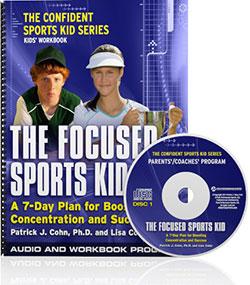Mental focus is especially critical in figure skating, where skaters have just four and a half minutes to perform over a dozen high-risk elements with confidence and accuracy, says Scott Smith, an internationally competitive figure skater and the alternate in the 2006 Olympic games. There are no second chances in skating.
How does he stay focused? “Practice focusing!” he says. Smith practices his competitive routine as though he is competing: without stopping and with all the difficult elements.
“Each day I learn how to physically and mentally get through my routine better through my successes and my failures,” he says.
Repetition is the key to focus, says Smith. “It gets easier to do something under pressure when you have done it hundreds of times,” he says. “I always feel more confident at an event knowing I have run through my elements more than my competitors.”
In addition to physical repetition, visualization techniques are another way for athletes to attain the benefits of repetition–without wearing out their bodies. “When I was injured, or when needing to rest my body, I would watch videos of myself doing all of my elements really well,” says Smith. “I even closed my eyes and reminded myself how the element feels when I do it correctly. I go through all the mental steps of performing each element.”
Visualizing the elements performed at the highest level helps keep Smith’s mind and body familiar with the important aspects of the difficult elements.
In order to focus during a critical moment or after a mistake, Smith reminds himself of the simple steps he visualized and practiced throughout the year. “I focus on one or two technique words going into each difficult element rather than on the situation,” He says.
“For example, going into a triple axel I think, ‘Bend the left knee and kick the right leg hard on the take off,’ rather than thinking, ‘You better land this because you are trying to make the Olympic team!'”
By maintaining the same focus on the technical components of performing each element, Smith is able to perform the most difficult elements without the weight of the moment affecting his mental game, whether it is at the biggest event of the year, or after a costly mistake.
Learning to focus, he says, is like learning other skills; Athletes need to be committed to practicing it every day.
Related Sports Psychology Articles
- Teach Sports Kids To Focus on What They Can Control
- Improve Sports Kids’ Confidence and Focus
- Tips for Young Athletes Focus
*Subscribe to The Ultimate Sports Parent Podcast
*Subscribe to Peak Performance Sports on Youtube
Download a free sports psychology report to improve your mental game
The Focused Sports Kid

“The Focused Sports Kid” is two programs in one. There’s a manual for parents/coaches, and a workbook for young athletes.
In addition to learning how to identify their distractions and deal with them, young athletes learn about how and why to focus on sports-specific “performance cues” that will help them feel more confident and excel in sports.
Parents/coaches also learn about these all-important performance cues and why they should help kids focus on them.
